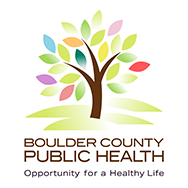Unlike a public drinking water system, private wells do not have experts regularly checking the water quality before it is sent to the tap. Private well water quality varies from source to source depending upon the:
- Well’s depth below surface
- Aquifer and geologic formation the well is in
- Use of the land surrounding the well
- The well’s integrity.
Test for Contamination
Private well water may contain some natural impurities or contaminants, even with no human activity or pollution. For example, water moving through underground rocks and soils may pick up uranium, iron, arsenic, selenium, fluoride, magnesium, calcium and chlorides. Some contaminants like lead and copper can come from the piping used to transport the water to and through the home. The Environmental Protection Agency recommends annual well water testing.
As of December 20, 2014, Boulder County Public Health will no longer provide water testing at its water testing lab at 5605 63rd Street in Boulder. The last day samples may be dropped off for testing is Thursday, December 18. Learn more about water testing.
Health Impacts
Health concerns vary depending on amount and type of contaminants in the water, as well as frequency of contact and/or ingestion. Some contaminants, such as bacteria or nitrate, can cause illness after a short or small exposure (acute); other contaminants can create health issues after long exposure (chronic), for example after years of exposure to levels above EPA health standards.
Possible health effects of contaminated water include:
- Gastrointestinal illness: Nausea, vomiting, and diarrhea can be caused by microorganisms in drinking water. Illness can begin soon after the person is exposed to the contaminated water.
- Cancer: Some contaminants in drinking water, such as metals and solvents, can increase a person’s risk of getting cancer if the person is exposed to the contaminant over many years.
- Other chronic conditions: Some contaminants can increase the risk of chronic conditions, such as kidney disease, cardiovascular effects, or neurologic or developmental disorders.
- Other acute conditions: Some contaminants can increase the risk of acute conditions, such as blue baby syndrome (methemoglobinemia), skin rash, or lung irritation.
Operations & Maintenance
You can protect your water supply by:
- Always using a licensed contractor to construct water wells, install pumping equipment, and for any major repair or maintenance.
- Managing activities near your water source, such as construction and distance from septic tanks, drain fields, and livestock.
- Periodically inspecting exposed parts of wells for problems, such as:
- Cracked, corroded, or damaged well casings.
- Broken or missing well caps.
- Settling and cracking of surface seals.
- Sloping areas around wells to drain surface runoff away.
- Installing a well cap or sanitary seal to prevent unauthorized use of, or entry into, the well
- Having your water testing once a year for coliform bacteria.
- Keeping records of all well maintenance, especially disinfection or sediment removal processes that may require use of chemicals.
- Hiring a certified well driller for any new well construction, modification, abandonments or closures.
- Avoiding mixing or using pesticides, fertilizers, herbicides, degreasers, fuels, and other pollutants near a well.
- Not disposing of wastes in dry wells or in abandoned wells.
- Keeping well casings a minimum of 12 inches above the ground’s surface.
- Pumping and inspect septic systems annually.
- Never disposing of harsh chemicals, solvents, petroleum products, or pesticides in a septic system or dry well.
Well Operation & Maintenance
Groundwater Resources
State Engineer’s Office
303-866-3587
Boulder County Public Health Resources
- Water Testing
- How to Keep Your Water Well – Guide for Well Owners
Well Water Quality Near Oil & Gas Development
- Monitoring Water Quality in Areas of Oil & Natural Gas Development (A guide for water well users)



